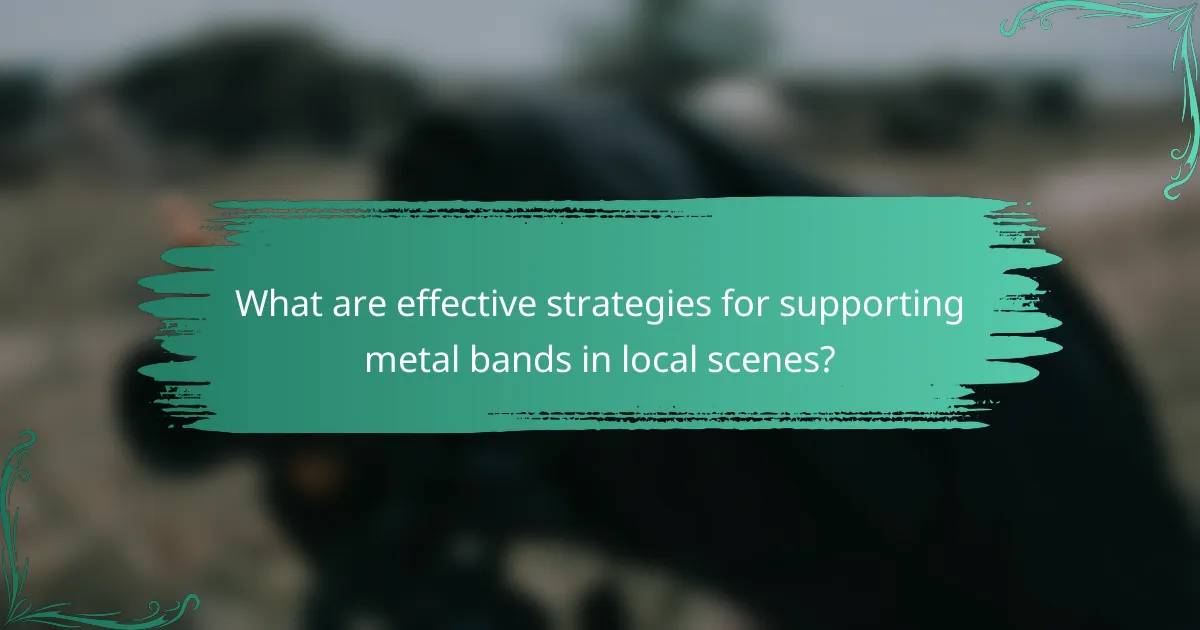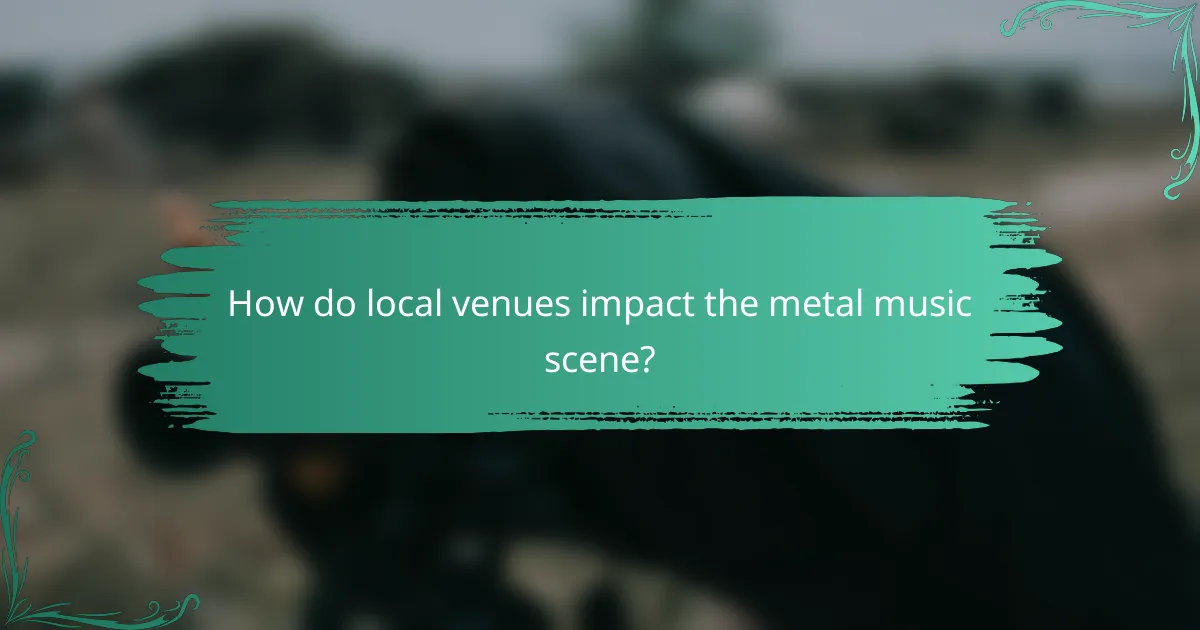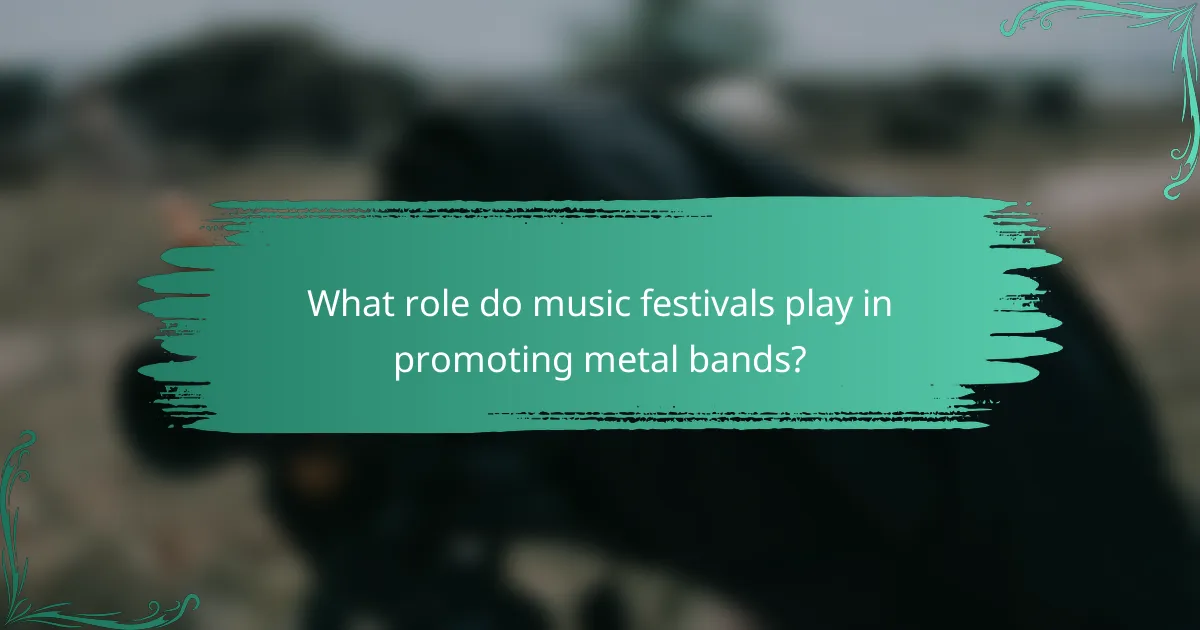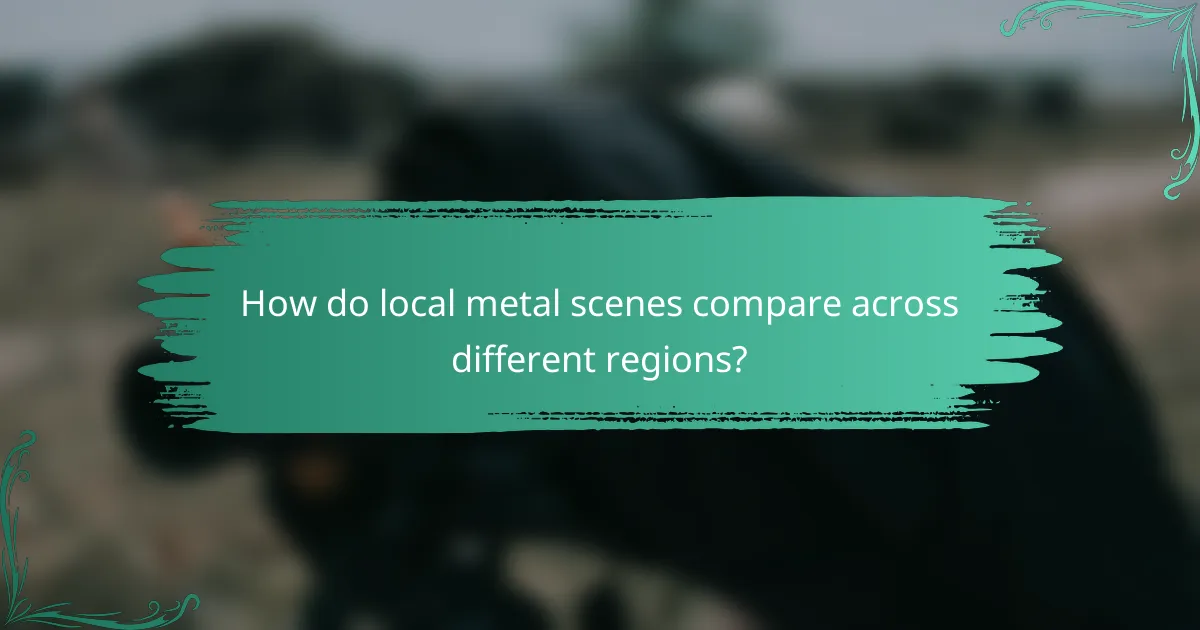Local music scenes play a crucial role in promoting iconic metal bands by cultivating an environment that encourages collaboration and visibility. Through events, media engagement, and community involvement, these scenes help build a dedicated fan base while supporting the growth of the genre. By fostering partnerships and enhancing merchandise opportunities, local scenes not only elevate the bands but also strengthen community connections.
![]()
How can local scenes promote iconic metal bands?
Local scenes can effectively promote iconic metal bands by creating a supportive environment that fosters collaboration and visibility. This involves organizing events, leveraging media platforms, and engaging the community to build a loyal fan base.
Community events and festivals
Community events and festivals serve as vital platforms for iconic metal bands to showcase their music. These gatherings can range from small local gigs to larger music festivals, providing opportunities for bands to perform live and connect with fans.
Organizing events that feature multiple bands can attract diverse audiences and create a vibrant atmosphere. For example, a weekend metal festival could include merchandise stalls, food vendors, and fan meet-and-greets, enhancing the overall experience and promoting the bands involved.
Local radio station support
Local radio stations play a crucial role in promoting iconic metal bands by airing their music and hosting interviews. Stations that focus on rock and metal genres can help bands reach new listeners and build a following within the community.
Engaging with local radio can include submitting tracks for airplay, participating in live sessions, or collaborating on promotional events. Bands should consider reaching out to stations that have a history of supporting local talent to maximize their exposure.
Social media campaigns
Social media campaigns are essential for promoting iconic metal bands in today’s digital landscape. Platforms like Facebook, Instagram, and Twitter allow bands to share updates, engage with fans, and promote upcoming shows or releases effectively.
Creating targeted campaigns that highlight band milestones, behind-the-scenes content, or special promotions can enhance visibility. Bands should also encourage fans to share their experiences and tag the band, creating a sense of community and expanding reach through user-generated content.

What are effective strategies for supporting metal bands in local scenes?
Effective strategies for supporting metal bands in local scenes include fostering collaborative performances, promoting merchandise sales at venues, and networking with local businesses. These approaches not only enhance visibility for the bands but also strengthen community ties and create a sustainable ecosystem for local music.
Collaborative performances
Collaborative performances involve multiple bands sharing a stage, which can draw larger crowds and create a vibrant atmosphere. This strategy allows bands to leverage each other’s fan bases, increasing exposure and potential new followers.
When organizing these events, consider varying the lineup to include different sub-genres of metal, which can attract diverse audiences. Additionally, scheduling these performances at popular local venues can enhance attendance and engagement.
Merchandise sales at local venues
Merchandise sales at local venues provide a direct revenue stream for metal bands while promoting their brand. Bands should offer a range of products, including T-shirts, stickers, and physical music formats, with prices typically ranging from $10 to $30.
Setting up a dedicated merchandise booth at shows can facilitate sales, and offering bundled deals can incentivize purchases. It’s essential to ensure that the merchandise reflects the band’s identity and resonates with their audience.
Networking with local businesses
Networking with local businesses can create mutually beneficial partnerships that support metal bands. Collaborating with local bars, record shops, and music venues can lead to promotional opportunities, sponsorships, or hosting events.
Consider offering exclusive discounts or promotions for local businesses that support the band. This can foster goodwill and encourage more businesses to participate in supporting the local music scene, ultimately benefiting all involved.
![]()
Which iconic metal bands originated in the United States?
Several iconic metal bands have their roots in the United States, significantly shaping the genre’s evolution. Bands like Metallica, Slayer, and Pantera not only pioneered new sounds but also influenced countless artists worldwide.
Metallica
Metallica, formed in 1981 in Los Angeles, is one of the most commercially successful metal bands globally. Their blend of thrash metal with melodic elements has produced classic albums like “Master of Puppets” and “The Black Album.”
The band is known for their powerful riffs and complex song structures, which have set a standard in the metal genre. They have received multiple Grammy Awards and have sold over 125 million albums worldwide, making them a cornerstone of American metal.
Slayer
Slayer emerged in 1981 in Huntington Park, California, and is renowned for their aggressive musical style and dark themes. Their album “Reign in Blood” is often cited as one of the greatest thrash metal albums of all time.
The band’s fast tempos, intricate guitar work, and provocative lyrics have influenced many metal subgenres. Slayer’s impact on the metal scene is profound, and they have maintained a loyal fan base throughout their career, culminating in their farewell tour in 2019.
Pantera
Pantera, formed in 1981 in Arlington, Texas, is credited with bringing a heavier sound to mainstream metal in the 1990s. Their album “Vulgar Display of Power” is a defining work that showcases their signature groove metal style.
With powerful riffs and intense live performances, Pantera has left a lasting legacy in the metal community. Their influence is evident in many modern metal bands, and they continue to be celebrated for their contributions to the genre even after their disbandment in 2003.

How do local venues impact the metal music scene?
Local venues play a crucial role in shaping the metal music scene by providing spaces for performances, fostering community engagement, and supporting emerging talent. These venues not only host concerts but also serve as hubs for collaboration and connection among fans and musicians.
Hosting live performances
Local venues are essential for hosting live performances, which are vital for the metal music scene. They provide a platform for both established and up-and-coming bands to showcase their music, often featuring a range of genres within metal. Regular gigs can draw crowds, helping to build a loyal fan base and create a vibrant local music culture.
Venues vary in size and capacity, from small clubs accommodating a few dozen fans to larger arenas that can host hundreds. Each type of venue offers unique opportunities for bands to connect with audiences, making it important for musicians to choose the right setting for their performances.
Providing rehearsal spaces
Rehearsal spaces are critical for metal bands to refine their sound and prepare for performances. Local venues often offer dedicated areas for bands to practice, which can be rented on an hourly or monthly basis. These spaces typically come equipped with essential gear, such as amplifiers and drum kits, allowing musicians to focus on their craft without the need for extensive personal equipment.
Access to affordable rehearsal spaces can significantly impact a band’s development, enabling them to experiment with new material and improve their performance skills. Bands should consider factors such as location, cost, and available equipment when selecting a rehearsal space.
Creating a fan community
Local venues are key in creating a fan community around the metal music scene. They provide a gathering place where fans can meet, share their passion for music, and discover new bands. Events such as themed nights, meet-and-greets, and merchandise sales can enhance community engagement and foster loyalty among fans.
Building a strong fan community often involves promoting local bands through social media and word-of-mouth. Venues can also collaborate with local businesses to offer discounts or promotions, further encouraging fans to attend shows and support their favorite artists.

What role do music festivals play in promoting metal bands?
Music festivals are crucial for promoting metal bands by providing a platform for exposure, networking, and media attention. They allow bands to reach new audiences, collaborate with other artists, and gain valuable publicity that can enhance their careers.
Exposure to larger audiences
Music festivals attract diverse crowds, giving metal bands the chance to perform in front of thousands of potential fans. This exposure can significantly increase a band’s visibility, leading to a rise in social media followers and streaming numbers.
For example, a band playing at a well-known festival may see their merchandise sales double or triple during the event, as attendees often purchase items from bands they discover live. Festivals can also help bands secure future gigs by showcasing their talent to promoters and venue owners.
Opportunities for collaboration
Festivals often feature multiple bands, creating an environment ripe for collaboration. Metal bands can connect with other artists, leading to joint performances, guest appearances, or even future recording projects.
Networking at these events can result in valuable partnerships, such as co-headlining tours or collaborative albums, which can amplify a band’s reach and influence within the metal community.
Media coverage and promotion
Media outlets frequently cover music festivals, providing bands with exposure through interviews, reviews, and social media posts. This coverage can introduce bands to audiences who might not otherwise discover them.
Additionally, festivals often have dedicated press teams that work to promote participating bands, ensuring they receive attention from local and national media. Bands should take advantage of these opportunities by engaging with journalists and sharing their stories to maximize their promotional impact.

How do local metal scenes compare across different regions?
Local metal scenes vary significantly across regions, influenced by cultural, economic, and social factors. These differences can affect the level of band support and the availability of venues, shaping the overall experience for musicians and fans alike.
Differences in band support
Band support can differ widely based on local culture and community engagement. In some regions, metal bands benefit from strong grassroots movements, with dedicated fan bases that actively promote shows and merchandise. Conversely, in areas where metal is less popular, bands may struggle to gain traction and find financial backing.
For example, cities with a rich history of metal, like Birmingham in the UK, often have established networks of promoters and venues that prioritize local acts. In contrast, smaller towns may lack the same level of infrastructure, making it challenging for bands to secure gigs and grow their audiences.
Variations in venue availability
The availability of venues for metal shows can greatly influence a local scene’s vibrancy. Urban areas typically offer a wider range of venues, from small clubs to larger arenas, allowing for diverse performance opportunities. In contrast, rural regions may have limited options, often relying on community centers or bars that may not cater specifically to metal music.
For instance, cities like Los Angeles have numerous iconic venues, such as The Whisky a Go Go, which regularly host metal acts. Meanwhile, smaller towns might only have one or two local bars that occasionally feature live music, restricting the chances for bands to perform and connect with fans.